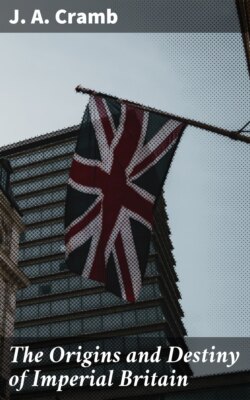Читать книгу The Origins and Destiny of Imperial Britain - J. A. Cramb - Страница 23
На сайте Литреса книга снята с продажи.
THE DEVELOPMENT OF THE POLITICAL IDEAL [Tuesday, May 15th, 1900]
ОглавлениеMan's path lies between the living and the dead, and History seems to move between two hemispheres that everywhere touch yet unite nowhere, the Past, shadowy, vast, illimitable, that at each moment ends, the Future not less shadowy, vast, illimitable, that at each moment begins. The question, "What is History?" is but the question, "What is Life?" transferred from the domain of the Present to the domain of the Past. To understand the whorl of a shell would require an intelligence that has grasped the universe, and for the knowledge of the history of an hour the aeons of the fathomless past were not excessive as a preliminary study. Massillon's injunction, "Look thou within," does but discover to our view in nerve-centres, in emotional or in instinctive tendencies, hieroglyphics graven by long vanished ancestral generations. But Nature, to guard man from despair, has fashioned him a contemporary of the remotest ages. The beam of light, however far into space it travel, yet remains unsevered from the orb whence it sprang, and Man, the youngest-born of Time, is yet one with the source whence he came. As age flies past after age, the immanence of the Divine grows more, not less insistent. Each moment indeed is rooted in the dateless past inextricably; but to its interpretation the soul comes, a wanderer from aeons not less distant, laden with the presaging memories, experiences, innumerable auxiliaries unseen, which the past itself has supplied for its own conquest or that of the present. Trusting to these, man is unmoved at the narrowness of his conscious sovereignty, as the eye is unmoved at the narrow bounds that hedge its vision, and finds peace where he would otherwise have found but despair.
Those affinities, those intimate relations of the past and present, are the basis of speculative politics. A judgment upon a movement in the present, an opinion hazarded upon the curve which a state, a nation, or an empire will describe in the future, is of little value unless from a wide enough survey the clear sanction of the past can be alleged in its support.
Assuming therefore that in the ideal delineated above we have the ideal of a race destined to Empire, and at last across the centuries grown conscious of that destiny, the question confronts us—is it possible out of the past, not surveying it from the vantage-ground of the present merely, but as it were living into the present from the past, to foreshadow the rise of this consciousness? Or turning back in the light of this consciousness to the past, is there offered by the past a justification of this interpretation of the present, of this movement styled "Imperialism"?
The heart of the matter lies in the transformation of mediaeval patriotism into modern imperialism, in the evolution or development which out of the Englishman of the earlier centuries has produced the Englishman of the present, moved by other and higher political ends. Is there any incident or series of incidents in our history, of magnitude enough profoundly to affect the national consciousness, to which we may look for the causes, or for the formative spirit, of this change? And in their effect upon the national consciousness of Britain have these incidents followed any law traceable in other nations or empires?
